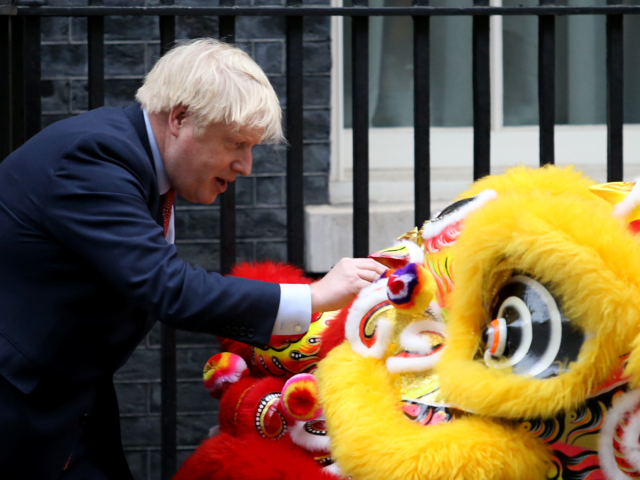Prime Minister Boris Johnson will reportedly re-open high-level trade talks with Communist China for the first time since 2018 despite concerns over widespread human rights abuses and the British parliament declaring a genocide is being committed in Xinjiang.
Trade talks between Britain and Beijing effectively collapsed in 2018 following the vicious crackdown on the pro-democracy movement in the former UK colony of Hong Kong and the imposition of the draconian national security legislation on the city, which has all but stamped out the freedoms promised to Hong Kong under the Sino-British Joint Declaration.
However, according to a report from POLITICO, Prime Minister Boris Johnson has personally pushed for a reset of post-Brexit trade talks with the communist state, a government official claimed. The news outlet said that government officials are currently in talks to set up a meeting of the U.K.-China joint economic and trade committee (JETCO) to open up negotiations with Beijing, the first time such a meeting will have been held since 2018.
It comes on top of reports indicating that Chancellor of the Exchequer Rishi Sunak is preparing to hold an economic summit with China, under the UK-China Economic and Financial Dialogue, which last met in 2019.
A government official told the online outlet: “The Treasury are keen to revive it for this year and are nervous about a more hawkish China policy.”
Commenting on the move, former Tory Party leader and co-founder of the Inter-Parliamentary Alliance on China, Sir Iain Duncan Smith said: “If this government decides that they are going to kowtow to China by going over there and begging them to trade I have to tell you that they can think again.
“I make no bones about this: I will not let it rest if we start now, amid all the evidence of genocide, brutality, crackdowns on peaceful protesters, and go traipsing along there as though nothing happened. There’s no good them telling us that they’re going to clean up their act — because they never do.
“The result of all of that is this will be a phenomenal breakthrough for China, who are just beginning to feel the pressure.”
Though Johnson’s administration has taken some actions against China, notably announcing a ban of Huawei equipment from its 5G networks from 2027 and joining limited international sanctions on the regime for the human rights atrocities in the concentration camp region of Xinjiang, it has consistently attempted to play both sides in seeking closer economic relations.
Last year, for example, the government released a foreign policy paper entitled ‘Global Britain in a Competitive Age’ admitted that China represents the “biggest state-based threat” to the UK, but there should nonetheless be cooperation with Beijing in order to gain “deeper trade links and more Chinese investment”.
China already represents the UK’s third-largest trading partner and the growing Chinese influence has been witnessed across the board in Britain, with political elites serving on the boards of state-controlled firms, major universities allegedly working alongside Chinese military-connected institutions to develop next-gen weapons technologies, the BBC allegedly taking cash from Chinese tech giant Tencent, and even a Chinese spy openly operating in Westminster for years.
Chinese investment has also seen at least seventeen independent schools in the UK being purchased by billionaires with ties to the Communist Party, raising concerns over the independence of the curricula being taught to British children.
Just two months before the Global Britain policy paper was released, the Prime Minister’s own party’s human rights commission announced: “We believe that the CCP is committing mass atrocity crimes against the Uyghurs and others in [Xinjiang]… and that is evidence indicative of the crime of genocide.”
Survivors of the Xinjiang camps — which Beijing has attempted to brand as vocational training centres — have reported that the inhabitants, which include ethnic minorities such as the Uyghur, Kazak, and Kyrgyz peoples, are subjected to torture, rape, forced sterilisation, and organ harvesting.
On top of the widespread human rights abuses throughout China, leading Brexit figures, including Nigel Farage, have lamented that Johnson appears to be keen to replace Brussels for Beijing instead of repatriating industry and jobs back to Britain — a key promise of the Brexit movement.
Former Brexit Minister David Davis said of the latest attempt to cozy up to the communist state: “The government should operate a coherent China policy which reflects our views on everything from the treatment of the Uyghurs to trade issues like Huawei to the behavior over Taiwan and Hong Kong.
“This seems to be completely at odds with that and it is hard to see how it could deliver success — if it did it would come at a cost of undermining every other aspect of our attempts to make the Chinese behave in a civilized manner.”
Follow Kurt Zindulka on Twitter here @KurtZindulka

COMMENTS
Please let us know if you're having issues with commenting.